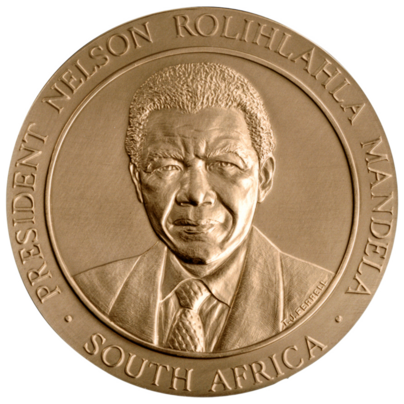[AUTHENTICITY CERTIFIED: Text version below transcribed directly from audio.]
 President Clinton, Mr.
Speaker, Distinguished Members of the Senate and the House, ladies and
gentlemen:
President Clinton, Mr.
Speaker, Distinguished Members of the Senate and the House, ladies and
gentlemen:
There's one regret I've had throughout my life -- that I never became the heavyweight boxing champion of the world.
I would like my friend, Evander Holyfield, to know that today, I feel like the heavyweight boxing champion of the world.
It has been my great privilege to serve a people whose bondage to an inhuman system evoked the solidarity of all those who love freedom and justice -- a people whose triumph over the divisions of racist doctrine has given new life to humanity's hopes for a world without hatred or discrimination.
 I am conscious that in
bestowing the
Congressional Gold Medal upon me, you are evoking these
bonds between our nations, and paying tribute to the whole South African
nation for its achievements in realizing our shared ideals. It is in
that spirit that I humbly accept the award, aware at the same time of
the great honor you do me by using me as the vehicle of a unique
distinction confirmed -- conferred by this hallowed institution of American
democracy.
I am conscious that in
bestowing the
Congressional Gold Medal upon me, you are evoking these
bonds between our nations, and paying tribute to the whole South African
nation for its achievements in realizing our shared ideals. It is in
that spirit that I humbly accept the award, aware at the same time of
the great honor you do me by using me as the vehicle of a unique
distinction confirmed -- conferred by this hallowed institution of American
democracy.
As one who has dedicated his life to the pursuit of unity, I am moved by the consensus in your nation's regard for the achievements of my people. And I feel great pride in the fact that to the few citizens of other countries who have received this high honor, the name of an African is now added.
If today the people of South Africa are free at last to address their basic needs; if the countries of southern Africa have the opportunity to realize the potential for development through co-operation; if Africa can devote all her energies and resources to her reconstruction -- then it is not least because the American people identified with and lent their support to the struggle to end apartheid, including critically through action by this Congress.
It is also because of the actions of countless ordinary American citizens who responded to the call to join the world-wide anti-apartheid campaign, or who have since joined hands with us as we strive to make a living reality of our vision of a better life for all South Africans.
Among those we remember today is young Amy Biehl. She made our aspirations her own and lost her life in the turmoil of our transition, as the new South Africa struggled to be born in the dying moments of apartheid. Through her, our peoples have also shared the pain of confronting a terrible past, as we take the path towards the reconciliation and healing of our nation.
In all these ways, the United States and its people have played a significant role in the birth of our new nation. Since the achievement of democracy, the relations between our countries have been steadily growing. We appreciate the commitment to our future that was embodied in the decision to set up the Bi-National Commission, and that has informed the Commission's contribution to the systematic development of an all-round relationship between our countries.
The highly successful State Visit by President Clinton to South Africa in March this year testified as to the strength of our relationship. The warm welcome he received from our people speaks of the special place that the people of the United States occupy in the hearts of South Africans. The breadth of our relationship makes the United States an indispensable partner in bringing material improvement in the lives of our people -- especially the poor, without which our democracy would remain a hollow shell and our stability fragile.
Yet we need to remind ourselves that, as much as we have made progress in changing our peoples' lives for the better, the needs that must be met in our country, our region, and our continent are immense. Though we are long past blaming our past for our problems, it does need to be acknowledged that the imbalances and inequities bequeathed to us by the history of Africa and South Africa, are beyond our capacity to meet on our own. They call for a partnership of Africa and the United States, developing and developed countries, in bringing about a transfer of resources and addressing the imbalances and disparities which have been so dramatically exposed in the turmoil in the world economic system.
In the common agenda that we seek to develop with you are such issues as increased aid, the rescheduling of the burden of external debt, improved access to markets for the products of developing countries. It includes also the democratization of the institutions of international governance and the redirection of the world's trade and financial system so that it better reflects the needs of the poor.
The recognition that even the most powerful economy in the world is not immune from the consequences of defects in the global economic system, so forcefully articulated recently by your own President, indicates to us that the needs of developing countries, and of Africa in particular, will have an understanding hearing in Washington. It adds to our confidence that the United States will be in the forefront of the supporters of Africa's struggle to bring about her relations.
Honorable Members: I do not expect to be granted again the privilege of addressing the elected representatives of the United States of America. I am proudly grateful to have been allowed to do so in the last months of my public life.
Though the challenges at the present time for our country, our continent, and the world are greater than those we have already overcome, we face the future with confidence. We do because, despite the difficulties and the tensions that confront us, there is in all of us the capacity to touch one another's hearts across oceans and continents.
The award with which you honor me today is an expression of the common humanity that binds us: one person to another, nation to nation, and people of the north to people of the south. I receive [it] with pride as a symbol of partnership for peace, prosperity, and equity, as we enter the new millennium.
I thank you.
Image of Medal Source: Wikimedia.org
Original Video Source: William J. Clinton Presidential Library and Museum
Audio AR-XE Note: Digitally enhanced for clarity and rhetorical force
Also in this database:
Maxine Waters (D-CA) House Floor Speech on Nelson
Mandela
Page Updated:11/8/24
U.S. Copyright Status: Text, and Audio = Unknown. Video = Property of AmericanRhetoric.com. Image of Medal = Public domain.
